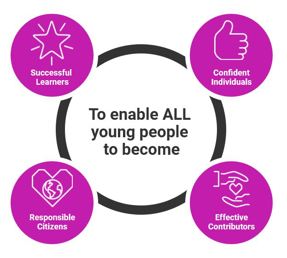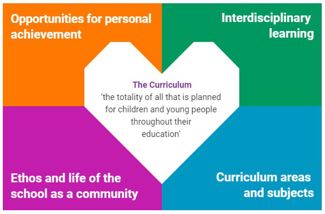Curriculum for Excellence (CfE) is the Scottish National Curriculum which applies to all children and young people aged 3-18, wherever they are learning. It aims to raise achievement for all, enabling children and young people to develop the skills, knowledge and understanding they need to succeed in learning, life and work.
 It places learners at the heart of education and at its centre are four fundamental capacities. These capacities reflect and recognise the lifelong nature of education and learning. The four capacities are aimed at helping children and young people to become:
It places learners at the heart of education and at its centre are four fundamental capacities. These capacities reflect and recognise the lifelong nature of education and learning. The four capacities are aimed at helping children and young people to become:
- Successful learners
- Confident individuals
- Responsible citizens
- Effective contributors

As part of their learner journey, all children and young people in Scotland are entitled to experience a coherent curriculum from 3 to 18, in order that they have opportunities to develop the knowledge, skills and attributes they need to adapt, think critically and flourish in today’s world.
Curriculum is defined as the totality of all that is planned for children and young people from early learning and childcare, through school and beyond. That totality can be planned for and experienced by learners across :
- Curriculum areas and subjects
- Interdisciplinary learning
- Ethos and life of the school
- Opportunities for personal achievement
Curriculum entitlements
Children and young people’s rights and entitlements are central to Scotland’s curriculum and every child and young person is entitled to experience:
- a curriculum which is coherent from 3 to 18;
- a broad general education, including well planned experiences and outcomes across all the curriculum areas from early years through to S3. This includes understanding the world, Scotland’s place in it and the environment, referred to as Learning for Sustainability;
- a senior phase, after S3, which provides opportunities to attain and achieve, including to study for qualifications, awards and other planned activities to develop the four capacities;
- opportunities for developing skills for learning, skills for life and skills for work;
- opportunities to maximise their individual potential, benefitting from appropriate personal support and challenge;
- support to help them move into positive and sustained destinations beyond school.
Curriculum areas
- Expressive Arts – including art and design, dance, drama and music
- Health and Wellbeing – mental, emotional, social and physical wellbeing; PE; food and health; substance misuse; and relationships, sexual health and parenthood
- Languages – listening and talking, reading and writing in English and modern languages, plus classical languages and literacy, and Gaidhlig/Gaelic learners (where available)
- Mathematics – including analysing information, solving problems and assessing risk
- Religious and Moral Education (denominational and non-denominational) – learning about Christianity, other world religions, and developing values and beliefs
- Sciences – understanding important scientific concepts across planet Earth, forces, electricity and waves, biological systems, materials and topical science
- Social Studies – understanding people, place and society in the past and present including history, geography, modern studies and business education
- Technologies – including computing science, food, textiles, craft, design, engineering, graphics and applied technologies
Additional important themes across the curriculum are creativity, enterprise and global citizenship, which include sustainable development, international education and citizenship.
Curriculum levels
There are national levels to describe different stages of learning and progress. For most children the expectation is:
- Early Level – early learning and childcare to the end of P1
- First Level – to the end of P4
- Second Level – to the end of P7
- Third and Fourth Levels – S1 to S3, with the fourth level broadly equivalent to SCQF level 4
- Senior Phase – S4-S6, and equivalents in other settings, where pupils/students can continue to develop the four capacities and achieve qualifications
